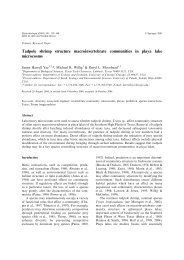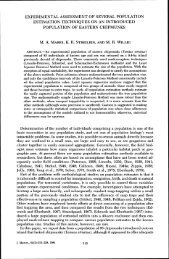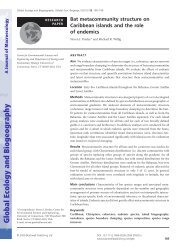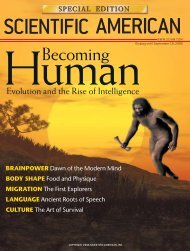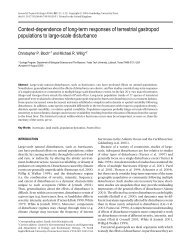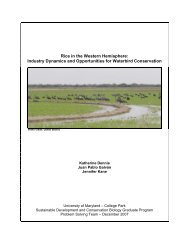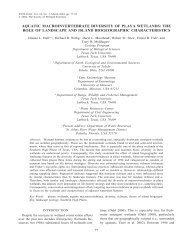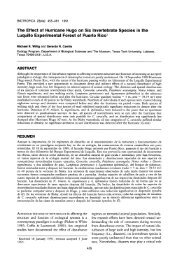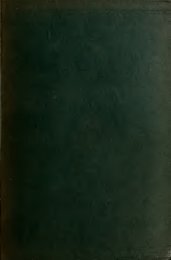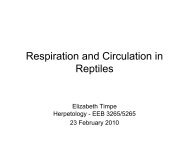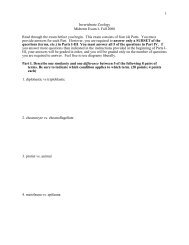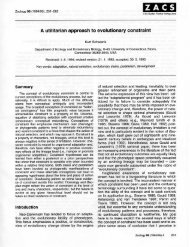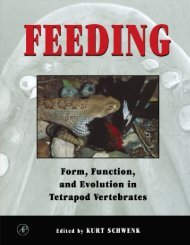- Page 1 and 2: TABLE OF CONTENTS THE THEORY OF ECO
- Page 3 and 4: Chapter 1: A General Theory of Ecol
- Page 5 and 6: Chapter 10). Without such boundarie
- Page 7 and 8: profound. As the statistician Georg
- Page 9 and 10: In general, the domain of a theory
- Page 11 and 12: Physiological ecology is likely ano
- Page 13 and 14: of a theory. A theory is constantly
- Page 15 and 16: component of the process of natural
- Page 17 and 18: Literature cited Arnold, W., T. Ruf
- Page 19 and 20: Scheiner, S. M. submitted. Towards
- Page 21 and 22: Table 1.2. Definitions of terms for
- Page 23 and 24: Chapter 2: Theory Makes Ecology Evo
- Page 25 and 26: captured the multifaceted complexit
- Page 27 and 28: proposition is less formal, some mi
- Page 29 and 30: diversity and the size of the area
- Page 31 and 32: a systematic analysis of the struct
- Page 33 and 34: circumstance related to theory that
- Page 35 and 36: vegetation types, a simple combinat
- Page 37 and 38: author) was impressive. Although fe
- Page 39 and 40: separate theoretical problems that
- Page 41 and 42: indirect effects and enemy-mediated
- Page 43 and 44: effects of diversity on the stabili
- Page 45: to any major extent. Although ecosy
- Page 49 and 50: Forbes, S. 1887. The lake as a micr
- Page 51 and 52: MacArthur, R.H. and E.O. Wilson. 19
- Page 53 and 54: Strong, D. R. 1984. Exorcising the
- Page 55 and 56: Table 2.1. Major theoretical develo
- Page 57 and 58: 1969 Individual thermodynamic budge
- Page 59 and 60: c e n e a ra p a p f r o e rd O 20
- Page 61 and 62: Figure 2.4. Number of papers found
- Page 63 and 64: Chapter 3: A General, Unifying Theo
- Page 65 and 66: the number of predators and the gro
- Page 67 and 68: Robert MacArthur, E. O. Wilson, Egb
- Page 69 and 70: Suppose we have a phase space where
- Page 71 and 72: group. The state variables and para
- Page 73 and 74: superset of the former’s domain;
- Page 75 and 76: Literature Cited Abrams, P. (1983)
- Page 77 and 78: Figure 3.1. Density-dependent selec
- Page 79 and 80: foraging for resources. Although pr
- Page 81 and 82: foraging on the same prey, and on p
- Page 83 and 84: environment). In a later section, I
- Page 85 and 86: published a seminal book that summa
- Page 87 and 88: always be taken when encountered. S
- Page 89 and 90: analyses of optimal sampling (DeGro
- Page 91 and 92: previous models, dynamic state-depe
- Page 93 and 94: functions that are part of these mo
- Page 95 and 96: Foraging behavior often balances th
- Page 97 and 98:
esources. In recent years, renewed
- Page 99 and 100:
foragers often show adaptive respon
- Page 101 and 102:
y species of conservation concern.
- Page 103 and 104:
Charnov, E.L., G.H. Orians and K. H
- Page 105 and 106:
Lima, S.L. 1998. Stress and decisio
- Page 107 and 108:
Salo, P., E. Korpimaki, P.B. Banks,
- Page 109 and 110:
Werner, E.E. and J.F. Gilliam 1984.
- Page 111 and 112:
12. Foraging behavior often balance
- Page 113 and 114:
113 Figure 4.2. A graphical present
- Page 115 and 116:
Chapter 5: Ecological Niche Theory
- Page 117 and 118:
ecologists, and evolutionary biolog
- Page 119 and 120:
simply intended to serve as a backd
- Page 121 and 122:
esource is in mass balance (sensu H
- Page 123 and 124:
Proposition 2 For more than one spe
- Page 125 and 126:
non-equilibrial (cycling) dynamic i
- Page 127 and 128:
also likely as a result of disturba
- Page 129 and 130:
Literature Cited Abrams, P. A. and
- Page 131 and 132:
Gravel, D., C. D. Canham, M. Beaude
- Page 133 and 134:
Shurin, J. B., P. Amarasekare, J. M
- Page 135 and 136:
Table 5.1. The background and propo
- Page 137 and 138:
Chapter 6: Single Species Populatio
- Page 139 and 140:
DOMAIN OF THE THEORIES The domain o
- Page 141 and 142:
As another example, one can focus o
- Page 143 and 144:
where adults lay eggs, which are su
- Page 145 and 146:
We note that both of these solution
- Page 147 and 148:
density dependence has long transie
- Page 149 and 150:
ecognizing these assumptions is an
- Page 151 and 152:
Literature Cited Caswell, H. 2001,
- Page 153 and 154:
Chapter 7: Natural enemy-Victim Int
- Page 155 and 156:
among species in the kinds of resou
- Page 157 and 158:
2. Satiation in predators, and time
- Page 159 and 160:
eproduction. Because natural enemy-
- Page 161 and 162:
assume the natural enemy is a speci
- Page 163 and 164:
A series of fundamental constraints
- Page 165 and 166:
General (but not universal) dynamic
- Page 167 and 168:
in demography and physical biology.
- Page 169 and 170:
∂f N ∂fP ∂f N ∂f P > , (9)
- Page 171 and 172:
interactions. In addition to its im
- Page 173 and 174:
many examples and so is a reasonabl
- Page 175 and 176:
ecause goose defense strategies bec
- Page 177 and 178:
So a ratio-dependent model such as
- Page 179 and 180:
aggressive interference) due to cau
- Page 181 and 182:
dS = R − i( I, S) − mS + γ I d
- Page 183 and 184:
zero, the model becomes identical t
- Page 185 and 186:
alternative food resources than the
- Page 187 and 188:
theoretical extensions for understa
- Page 189 and 190:
Literature cited Abrams, P.A. 1992.
- Page 191 and 192:
Deng, B., S. Jessie, G. Ledder, A.
- Page 193 and 194:
Hochberg, M.E., R. Gomulkiewicz, R.
- Page 195 and 196:
McCauley, E., W.A. Nelson and R.M.
- Page 197 and 198:
Schoener, T.W. 1986. Overview: Kind
- Page 199 and 200:
Density Figure 7.1. An example of d
- Page 201 and 202:
numerator), and so weakens the appa
- Page 203 and 204:
metacommunity theory is still in it
- Page 205 and 206:
1) Dispersal contributes to local c
- Page 207 and 208:
theory in its general form is to hi
- Page 209 and 210:
to disturbances and environmental c
- Page 211 and 212:
more realistic view would model dis
- Page 213 and 214:
diversity’ starts out high and de
- Page 215 and 216:
• Niche Theory (Chase Chapter 5)
- Page 217 and 218:
iogeographic contingencies that cha
- Page 219 and 220:
interacting organisms in metacommun
- Page 221 and 222:
Cottenie K. & De Meester L. (2005).
- Page 223 and 224:
Skellam J. (1951). Random dispersal
- Page 225 and 226:
Invasible local communities should
- Page 227 and 228:
Patch Heterogeneity Figure 8.2. The
- Page 229 and 230:
Figure 8.4 Experimental results of
- Page 231 and 232:
to each other, and the meaning of e
- Page 233 and 234:
adaptation, physiology, and plastic
- Page 235 and 236:
Proposition 2: Successional pattern
- Page 237 and 238:
particularities required through it
- Page 239 and 240:
immigration. Thus, although the spe
- Page 241 and 242:
and Shelford 1939), or of Holdridge
- Page 243 and 244:
egion. The length of the resource g
- Page 245 and 246:
succession states that 1) if sites
- Page 247 and 248:
transition probabilities from earli
- Page 249 and 250:
exploiting contested and low levels
- Page 251 and 252:
appear in those current communities
- Page 253 and 254:
from society. When the theory was i
- Page 255 and 256:
systems. That spatial and temporal
- Page 257 and 258:
Botkin D.B. and Sobel M.J. 1975. St
- Page 259 and 260:
Farrell, T. M. 1991. Models and mec
- Page 261 and 262:
Keever C. 1979. Mechanisms of plant
- Page 263 and 264:
Pacala S.W., Canham C.D. and Siland
- Page 265 and 266:
Tilman D. 1991. Constraints and tra
- Page 267 and 268:
Figure 9.2. An idealized filter mod
- Page 269 and 270:
Figure 9.4. A model template for th
- Page 271 and 272:
Patch Dynamics Metapopulation Dynam
- Page 273 and 274:
Table 9.1. Contrasts between classi
- Page 275 and 276:
and to state the permissible relati
- Page 277 and 278:
Principles underlying the ecologica
- Page 279 and 280:
As suggested above, not all authors
- Page 281 and 282:
Channel Islands of California (Diam
- Page 283 and 284:
increased if dispersal limitations
- Page 285 and 286:
some are larger, some more fecund,
- Page 287 and 288:
the 19 th Century (Sax et al. 2007)
- Page 289 and 290:
nearly-flat, but increasing very sl
- Page 291 and 292:
question remains whether modificati
- Page 293 and 294:
maintained, despite turnover in spe
- Page 295 and 296:
Literature cited Allen, A. P., J. F
- Page 297 and 298:
Huey, R. B., G. W. Gilchrist, M. L.
- Page 299 and 300:
Simberloff, D., and E. O. Wilson. 1
- Page 301 and 302:
Table 10.1: Propositions of the Equ
- Page 303 and 304:
Figure 10.2. The Equilibrium Theory
- Page 305 and 306:
NEE, net ecosystem exchange, is the
- Page 307 and 308:
Application and advancement of thes
- Page 309 and 310:
activities, they control the elemen
- Page 311 and 312:
Theory 2: The effects of disturbanc
- Page 313 and 314:
fuels, forest products, water, and
- Page 315 and 316:
Literature cited Aber, J., and J. M
- Page 317 and 318:
Odum, H. T. 1983. Systems ecology.
- Page 319 and 320:
Table 11.1. Relationship of Ecosyst
- Page 321 and 322:
Figure 11.1. Net ecosystem producti
- Page 323 and 324:
Figure 11.3. There are 4 possible r
- Page 325 and 326:
Ecosystem responses to global chang
- Page 327 and 328:
Proposition 1. Interactions across
- Page 329 and 330:
where dispersal to other patches be
- Page 331 and 332:
environment is often altered to per
- Page 333 and 334:
transport of propagules, toxins, an
- Page 335 and 336:
develops into a hurricane (Gray 199
- Page 337 and 338:
ecognized and better appreciated as
- Page 339 and 340:
multi-site analyses has been access
- Page 341 and 342:
Literature Cited Albertson, F.W., a
- Page 343 and 344:
Goldenberg, S.B., C.W. Landsea, A.M
- Page 345 and 346:
Liu, J. and J. Diamond. 2005. China
- Page 347 and 348:
Peters, D. P. C., R. A. Pielke, Sr,
- Page 349 and 350:
The State of the Nation’s Ecosyst
- Page 351 and 352:
Figure captions Figure 12.1. Two pr
- Page 353 and 354:
Figure 12.1. 353
- Page 355 and 356:
Figure 12.3 355
- Page 357 and 358:
Chapter 13: A Theory of Ecological
- Page 359 and 360:
Although the constitutive theory th
- Page 361 and 362:
the world: we do not claim that all
- Page 363 and 364:
esource is limiting for all species
- Page 365 and 366:
areas of greatest resource or least
- Page 367 and 368:
about the long-term persistence of
- Page 369 and 370:
the species and type of environment
- Page 371 and 372:
from principle 7. Proposition 3 is
- Page 373 and 374:
that species-abundance curves are d
- Page 375 and 376:
level of resources, it may be usefu
- Page 377 and 378:
confronted by such challenges, ecol
- Page 379 and 380:
Literature Cited Abrams, P. A. 1988
- Page 381 and 382:
Grime, J. P. 1973. Competitive excl
- Page 383 and 384:
Oksanen, L., S. D. Fretwell, J. Arr
- Page 385 and 386:
Waide, R. B., M. R. Willig, C. F. S
- Page 387 and 388:
Table 13.2. Models of diversity gra
- Page 389 and 390:
Figure 13.1. Gradient theory and sp
- Page 391 and 392:
Chapter 14: Biogeographical Gradien
- Page 393 and 394:
scale spatial context of biogeograp
- Page 395 and 396:
each for many compelling and longst
- Page 397 and 398:
heat source). Parameters were varie
- Page 399 and 400:
et al. (2001) (Proposition 9). In t
- Page 401 and 402:
anges are larger, given the same to
- Page 403 and 404:
Models in this group have begun to
- Page 405 and 406:
exploration. With the empirical spe
- Page 407 and 408:
example, nearly 70% of the 241 spec
- Page 409 and 410:
that the latitudinal gradient in me
- Page 411 and 412:
fourth issue is that the absolute s
- Page 413 and 414:
Literature Cited Bell, G. 2000. The
- Page 415 and 416:
Dobzhansky, T. 1950. Evolution in t
- Page 417 and 418:
Kerr, J. T., M. Perring, and D. J.
- Page 419 and 420:
Rahbek, C. and G. R. Graves. 2000.
- Page 421 and 422:
Willig, M. R., D. M. Kaufmann, and
- Page 423 and 424:
equires additional exposition to un
- Page 425 and 426:
population, community) may conspire
- Page 427 and 428:
evolve.” Using a historical persp
- Page 429 and 430:
dynamics theory (Hastings Chapter 6
- Page 431 and 432:
group of ecologists who were frustr
- Page 433 and 434:
understanding the conditions that f
- Page 435 and 436:
the end. But it is, perhaps, the en
- Page 437 and 438:
Hagen, J. B. 1992, An Entangled Ban
- Page 439 and 440:
Figure 15.1. The biological organiz
- Page 441:
Figure 15.3. This conceptual model



